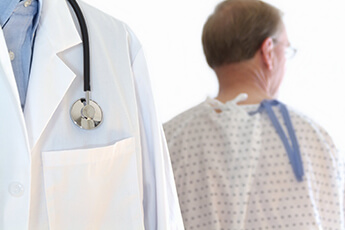Prostate cancer vs. testicular cancer: Their similarities and differences

Prostate cancer and testicular cancer share some common traits — they both begin in parts of the male reproductive system, both are highly treatable, and they share some treatment modalities — but there are significant differences between the two diseases.
In this article, we’ll discuss the basics of each disease, how they relate to each other, their symptoms, and the treatment your doctor may recommend if you have been diagnosed with one of these cancers.
Testicular cancer
Testicular cancer is a relatively uncommon cancer that will affect roughly 1 in 250 men over their lifespan, or fewer than one half of one percent. It is most common in men between the ages of 15 and 40. While testicular cancer is considered a rare disease, it is the most commonly diagnosed cancer among men in that age group. This cancer is particularly likely to affect white men.
Testicular cancer begins when a tumor forms in the testicles, or testes. The testicles serve a critical reproductive function as the source for the production of sperm. They also generate and release testosterone, a hormone essential for a variety of functions in the body.
The incidence of testicular cancer worldwide has been increasing rapidly for reasons that are still poorly understood. Risk factors for the disease include a family history of testicular cancer and cryptorchidism, also known as an undescended testicle, which occurs when one or both testicles remain inside the body after birth.
Testicular cancer, while serious, is highly treatable, with a five-year survival rate of over 95%.
Right after Christmas, my husband was diagnosed with stage 3 testicular cancer. BAM! Just like that our entire world changed ... After his chemo we found out that he has no detectable sperm. It may come back years from now, but chemo may have damaged the sperm’s DNA. I feel like the wind has been knocked out of me ... After all this, I still can't move on from the possibility of it happening on its own. Am I crazy? How did you do it? How do you enjoy life child-free? I'm having a hard time letting go. Any suggestions?
Prostate cancer
Prostate cancer is one of the most common forms of cancer in men, with about 1.2 million diagnoses globally every year. It generally affects men over the age of 45.
Prostate cancer begins when a tumor forms in the prostate, a small gland about the size of a ping-pong ball located near the base of the penis. The prostate is involved in several essential reproductive functions. It helps in the production of semen, the fluid that contains sperm, and is important in achieving and maintaining an erection. The prostate also helps to regulate the body's use of testosterone, which is produced in the testicles; in that sense, the prostate and testicles work together as part of a healthy reproductive system.
Risk factors for prostate cancer include age (over 65) and a family history of the disease. Black men are also at an elevated risk for prostate cancer for reasons that are not well understood.
Prostate cancer can be fatal, but it is highly treatable. The average 5-year survival rate for prostate cancer is excellent, at nearly 100 percent.
Like all cancers, both prostate and testicular cancer may metastasize, or spread to other parts of the body, leading to life-threatening complications. The goal of treatment for both diseases is to prevent, slow or stop that spread. Metastasis is more likely if the cancer goes undetected for a long period of time, so watching for symptoms and detecting problems early is very important.
Just diagnosed with prostate cancer ... The initial discussion with a PA focused on Active monitoring. The next appointment ... was with another PA who focused on surgical removal of the prostate. My thoughts were that, that was a bit drastic too soon. Would appreciate thoughts on this. I am 67 and active.
Symptoms of prostate and testicular cancer
Prostate cancer and testicular cancer have distinct sets of symptoms without much overlap. Diagnosis of both prostate cancer and testicular cancer must be done by a doctor. But there are symptoms that may call for a medical evaluation.
Prostate cancer symptoms
Early symptoms of prostate cancer may be mild, and can mimic those of many other diseases, like bacterial infections. They include:
difficulty urinating
pain or burning during urination
difficulty fully emptying the bladder
pain during ejaculation
persistent pain in the abdomen or lower back
Testicular cancer symptoms
Symptoms of testicular cancer are often even more mild than those of prostate cancer. They include:
a lump on one or both testicles
swelling of one or both testicles
a feeling of “heaviness” in the scrotum or lower abdomen
A tumor on the testicles generally feels like a firm, irregular lump. In some cases it may be accompanied by a dull ache in the abdomen, or even less commonly, sharp pain, but it often causes no pain at all.
As with any kind of cancer, early detection of testicular cancer is important for a positive outcome. But the fact that a testicular tumor is often painless may mean that it goes unnoticed. Regular self-examination can increase the chances that a tumor on the testicles is detected early.
Because the symptoms of testicular cancer and prostate cancer are so dissimilar, it is unlikely that they would be confused with each other. There is some limited evidence that testicular cancer survivors are at higher risk of more aggressive prostate cancer later in life, but overall survival rates don’t appear to be affected.
Diagnosis of testicular cancer and prostate cancer
If you’re concerned about testicular cancer or prostate cancer, your doctor may suggest screening for the diseases. The process for both will involve a physical examination, but the techniques are very different.
One common form of screening for prostate cancer is a digital rectal exam. During this exam, a medical professional will insert a finger 1-2 inches into your rectum to feel for abnormalities on the prostate. Another common type of screening is a prostate-specific antigen test. Antigens are substances produced normally by your prostate and detectable in the blood, but elevated levels of prostate antigens could indicate an infection, tumor, or other problem.
For men over the age of 50, the screenings above may be recommended on a routine basis.
Testicular cancer screenings can be self-administered, and males above the age of 15 should regularly screen themselves for the disease. A testicular self-examination involves gently rolling each testicle between the fingers to feel for lumps or irregularities.
If a lump is detected, a doctor may also perform this screening. They may also use an ultrasound device to create an image of the testicle to check for tumors. If a doctor suspects a cancerous growth, they may recommend orchiectomy, the removal of a testicle for further testing.
Treatment of testicular cancer and prostate cancer
While prostate cancer and testicular cancer have many differences in symptoms, detection, and demographic groups affected, there is some overlap in the most common treatment approaches for the two diseases.
Orchiectomy
Orchiectomy is the surgical removal of one or both testicles. It’s a procedure commonly used to treat both testicular cancer and prostate cancer, but for different reasons.
In the treatment of prostate cancer, the goal of orchiectomy is to reduce or eliminate the presence of testosterone, produced by the testes, in the body. Reducing or eliminating testosterone can slow or stop the growth of a prostate tumor.
When used to treat testicular cancer, the goal of orchiectomy is to remove the tumor itself and prevent metastasis. Orchiectomy may also be used as a diagnostic procedure in order to test a suspicious lump for the presence of cancerous cells.
I am writing this not because I've had testicular cancer----I have advanced metastatic prostate cancer. But I am writing it to share my experience of having my testicles removed with an orchiectomy, and to help guys who are going to have to undergo this procedure. In my case, the testosterone level was too high, and the only alternative to try to bring it down was an orchiectomy, so it was the most difficult decision of my adult life.
Radiation therapy
Treatment for both prostate cancer and testicular cancer may involve radiation therapy. While orchiectomy is the more common approach for testicular cancer, radiation therapy may be used for very early stage testicular cancers.
Radiation therapy for prostate cancer involves directing low levels of targeted radiation at the tumor within the prostate. This can be achieved either by aiming beams of energy at the prostate from a machine outside the body, or, less commonly, through the implantation of small pieces of radioactive material called seeds. When used to treat testicular cancer, radiation therapy is usually directed instead at lymph nodes in the lower abdomen. All of these treatments are generally performed as outpatient procedures.
Final notes
While prostate cancer and testicular cancer are serious diseases, the prognosis for patients is excellent for both when detected early. Make sure to speak with your doctor about any symptoms you notice and to have them checked promptly.
If you’d like to learn more about either of these cancers, the Men’s Health Community on Inspire can be a fantastic resource for information — and support.
Sources
https://www.cdc.gov/cancer/prostate/basic_info/symptoms.htm
https://www.mdpi.com/1648-9144/59/4/724
https://www.mayoclinic.org/diseases-conditions/testicular-cancer-care/diagnosis-treatment/drc-20352991
https://www.ncbi.nlm.nih.gov/pmc/articles/PMC8843166/
https://pubmed.ncbi.nlm.nih.gov/37109682/
https://www.pcf.org/patient-resources/family-cancer-risk/prostate-cancer-risk-factors/
https://www.hopkinsmedicine.org/health/conditions-and-diseases/prostate-cancer/prostate-cancer-prognosis
https://www.cdc.gov/cancer/prostate/basic_info/symptoms.htm
https://www.ncbi.nlm.nih.gov/pmc/articles/PMC8843166/
https://www.ncbi.nlm.nih.gov/books/NBK563159/
https://www.wjon.org/index.php/wjon/article/view/1191/915
Disclaimer
Member comments have been lightly edited for length and clarity. This content is for general informational purposes only and does not necessarily reflect the views and opinions of any organization or individual. The content should not be used as a substitute for professional medical advice, diagnosis, or treatment. Please consult your healthcare provider about any questions you may have regarding a medical condition.




